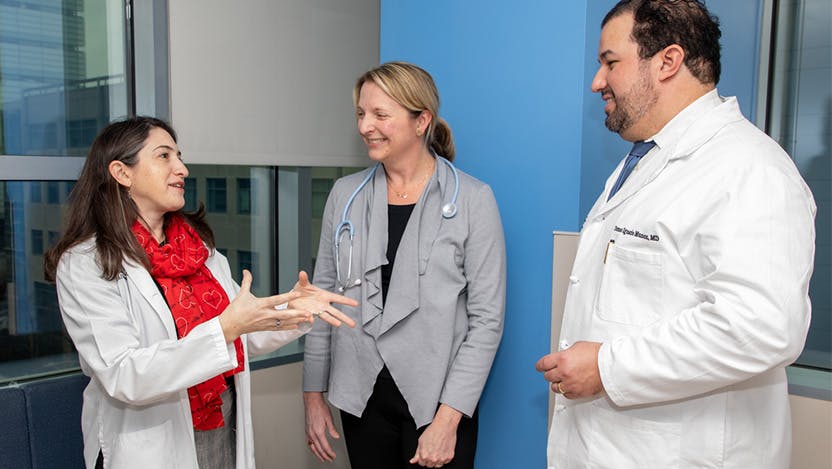Prioritizing physician well-being

At the height of the COVID-19 pandemic in 2021, a record 63% of surveyed U.S. physicians reported burnout. They were exhausted by the demands of caring for a seemingly endless stream of gravely ill patients.
The stressors of the pandemic may be over, but the American Medical Association (AMA) and other experts agree that a national physician burnout crisis continues to brew.
Neonatologist Bree Andrews, MD, MPH, is convinced that burnout at Comer Children’s and across UChicago Medicine can be averted by restoring physicians’ joy in the practice of medicine.
As the inaugural Chief Wellness and Vitality Officer for Physicians for the Biological Sciences Division and UChicago Medicine, Andrews is charged with creating a culture of well-being and professional fulfillment and helping physicians find meaning in their work.
“We want our physicians to do their most innovative work at UChicago Medicine and to be highly engaged and fulfilled taking care of our patients,” said Andrews. “There's an adage in the well-being field that if you can do 20% of what you love in your work, you'll do the other 80% of your job willingly. My goal is to help physicians find that 20% by improving their ease of practice, collegiality, mental health and resilience.”
Appointed to the new position in 2022, Andrews has recruited Well-Being Directors from each medical department to lead activities related to the engagement and wellness of clinical faculty.
The well-being field was founded on the principle that patient care will be better if physicians are concurrently taking care of themselves.
Melissa Tesher, MD, Section Chief of Pediatric Rheumatology, and neonatologist and sleep-medicine specialist Tomas Munoz, MD, are responsible for translating the needs of pediatric faculty into action. Munoz will also develop a program to provide sleep consultations and to improve physician sleep.
UC Well, the office for physician engagement and fulfillment, was created in early 2023. Foundational programming includes:
- Let’s Eat: A dining program that has already served 10,000 meals to physicians in faculty lounges
- Expansion of the #WhattoFix program, a crowdsourced campaign for improving ease of practice issues for clinicians
- Funding for 30-plus small-grant projects for well-being, co-development of the Arts in Medicine program at the Logan Center to give physicians an artistic experience after busy workdays, and 15 peer-coaching physician leaders who will make workplace coaching widely available
Andrews draws on her own career at Comer Children’s as an example of the vitality and fulfillment she wants all physicians to experience.
“I was given the freedom to develop a niche practice and design a unique program on how to care for babies once they've gone home from the NICU,” said Andrews, Director of the Center for Healthy Families.
As a scholar, Andrews uses mobile technology to improve parenting and patient outcomes. She also studies resuscitation at the border of viability using data on shared decision-making and healthcare use to inform practices. Most recently Andrews was part of an expert committee convened by the National Academies of Sciences, Engineering and Medicine to provide an overview of the identification, treatment and prognosis of low-birthweight U.S. babies at the behest of the Social Security Administration.
Andrews is also a Senior Scholar at the Bucksbaum Institute, where she mentors medical students, residents, and fellows on ways to improve the doctor-patient relationship.
“I love that I work at an institution that prizes this aspect of medicine,” she said. “One of my biggest goals as the Chief Wellness and Vitality Officer is to help other physicians have the fulfilling career I’ve had at UChicago Medicine.”
“The well-being field was founded on the principle that patient care will be better if physicians are concurrently taking care of themselves,” Andrews continued.
Yet mental health and professional fulfillment also hinge on collegiality. “We want to ensure that our medical teams work well together, that we’re unified in diversity, equity, and inclusion, and that we’re creating a cohesive community of people working toward the common goal of delivering exemplary patient care,” she said.
